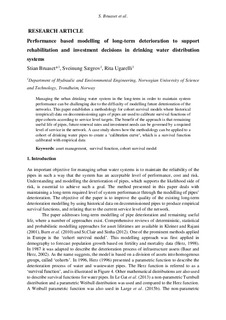Performance based modelling of long-term deterioration to support rehabilitation and investment decisions in drinking water distribution systems
Original version
10.1080/1573062X.2017.1395894Abstract
Managing the urban drinking water system in the long term in order to maintain system performance can be challenging due to the difficulty of modelling future deterioration of the networks. This paper establishes a methodology for cohort survival models where historical (empirical) data on decommissioning ages of pipes are used to calibrate survival functions of pipe cohorts according to service level targets. The benefit of the approach is that remaining useful life of pipes, future renewal rates and investment needs can be governed by a required level of service in the network. A case study shows how the methodology can be applied to a cohort of drinking water pipes to create a ‘calibration curve’, which is a survival function calibrated with empirical data.
